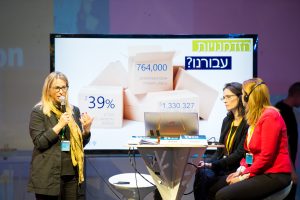Many workers in Israel encounter obstacles in their place of work due to the increasing introduction of technology into several practices and production processes, as these workers lack the proper knowledge and skills required to integrate into such working environments. The outcome of this process is expected to be particularly severe for workers in the lower levels of income and in general unskilled positions in the manufacturing industries.
The 2017 Maala International Conference included a session on the changing labor market and increasing digital literacy in the workforce. The session began with a talk on the impact of the changes in the world of work on the Israeli labor market. The speakers included Dr. Sigal Shelach, CEO, JDC Israel (former CEO at JDC-Tevet), Michal Tzuk, Director of Employment Regulations, Ministry of Economy, and Anat Gavriel, CEO, Unilever Israel.
Chair – Dr. Sigal Shelach | CEO of JDC Israel, (former CEO of JDC Israel-Tevet):
About 40% of professions will undergo significant changes – concerning news for current job holders, but an opportunity for introducing new options for work in new professions.
Dr. Sigal Shelach, JDC-Tevet. Maala international conference 2017. Photo: Yoav Zohar
Robotics, Automation and Artificial Intelligence are changing the world of work. The entire perception of work is changing – in the Twentieth Century, the perception was that academic and professional studies were the basis for a lifelong career. But today, for the new generation in the workforce, this model is not sufficient. The new generation will switch workplaces several times and will need ongoing learning throughout life, alongside changing skills. About 40% of professions will undergo significant changes, and provide new options for work in new professions.
Michal Tzuk | Director of Employment Regulations, Ministry of Economy:
The required skills don’t only include digital orientation, but also how to work in a computerized environment, the ability to self-learn and team-learn, creativity and entrepreneurship – all of which are crucial for fitting in to the changing workforce.

Michak Tzuk, Ministry of Economy. Maala international conference 2017. Photo: Sharon Amit
The essence of the changing labor market today is that the rate and frequency of changes is much higher than it ever was. Adapting to the changes in work runs in three courses: the first is that the training systems for work need to be faster, more responsive to the changes and need to work together with employers in order to adapt the learning methods the speed of change. The second course is to give information and guidance on how to cope with the changes and what skills are required to integrate into the workforce. The third course is acquiring appropriate skills for the changing labor market.
The skills don’t only include digital orientation, but also work in a computerized environment, the ability to self-learn and team-learn, creativity and entrepreneurship – all of which are crucial for adapting to the changing workforce. A system for acquiring these skills needs to be developed also for workers already in the workforce who lack the skills to adapt to the changing labor market. Today, acquiring relevant skills is equally as important as academic studies.
Anat Gavriel | CEO, Unilever Israel:
Unilever, as an employer, has taken responsibility for the up-skilling of its employees, and in particular improving their digital literacy

Anat Gavriel, Unilever Israel. Maala international conference 2017. Photo: Sharon Amit
Traditional industries are facing constant shortages of skilled employees. The development of robotics is transitioning the industry to increased automation, which also responds to the shortage in employees. Employees are therefore shifted to perform other tasks, necessitating their retraining for new duties and responsibilities. Unilever, as an employer, has taken responsibility for the up-skilling of its employees, and in particular improving their digital literacy, offering varied solutions, training and educational programs. Unilever aspires to improve digital literacy not only in the work environment but in the workers’ personal lives as well.




